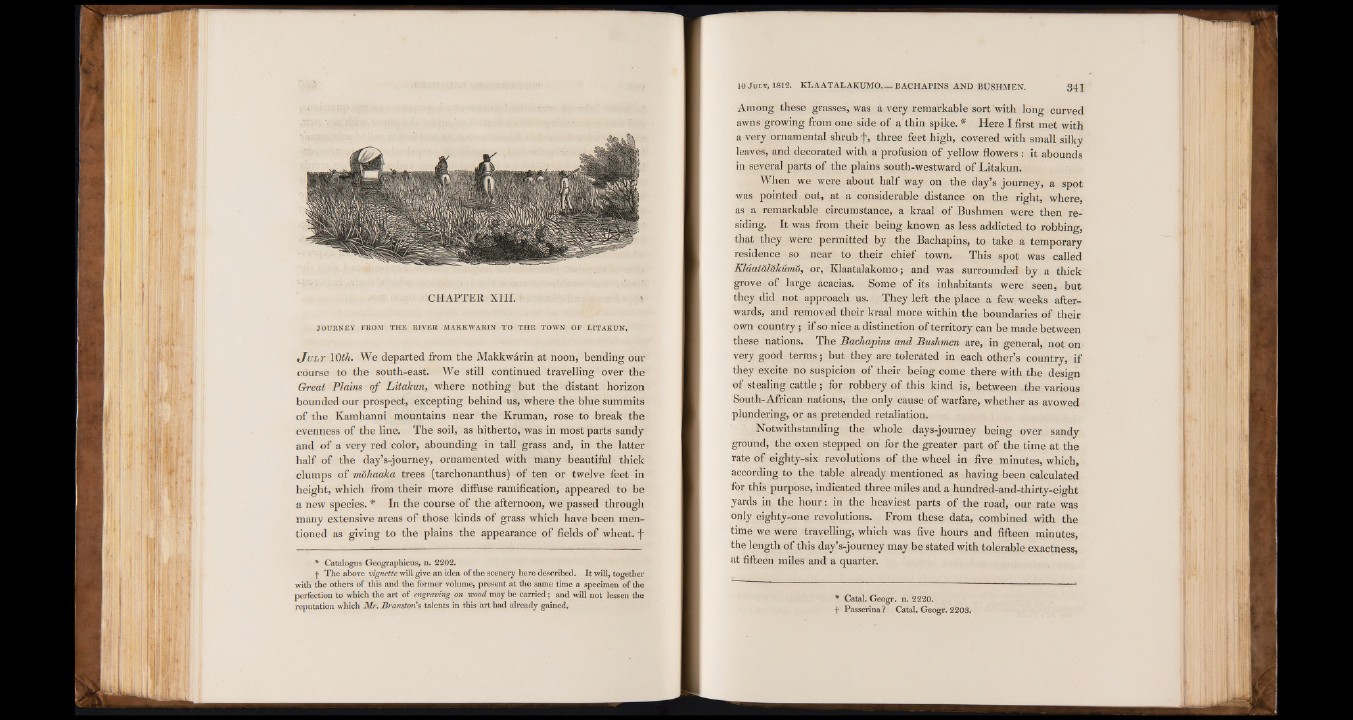
CHAPTER XIII. : i
JODRNEY FROM THE RIVER MAKKWARIN TO THE TOWN OF LITAKUN,
J u l y 10th. We departed from the Makkwarin at noon, bending our
course to the south-east. We still continued travelling over the
Great Plains of Litakun, where nothing but the distant horizon
bounded our prospect, excepting behind us, where the blue summits
of the Kamhanni mountains near the Kruman, rose to break the
evenness of the line. The soil, as hitherto, was in most parts sandy
and of a very red color, abounding in tali grass and, in the latter
half of the day’s-journey, ornamented with many beautiful thick
clumps of mohaaka trees (tarchonanthus) of ten or twelve feet in
height, which from their more diffuse ramification, appeared to be
a new species. * In the course of the afternoon, we passed through
many extensive areas of those kinds of grass which have been mentioned
as giving to the plains the appearance of fields of wheat, f
* Catalogus Geographicus, n. 2202.
f The above vignette will give an idea of the scenery here described. It will, together
with the others of this and the former volume, present at the same time a specimen of the
perfection to which the art of engraving on wood may be carried; and will not lessen the
reputation which Mr. Branston’s talents in this art had already gained.
-Among these grasses, was a very remarkable sort with Ion»- curved
awns growing from one side of a thin spike. * Here I first met with
a very ornamental shrub f, three feet high, covered with small silky
leaves, and decorated with a profusion of yellow flowers : it abounds
in several parts of the plains south-westward of Litakun.
When we were about half way on the day’s journey, a spot
was pointed out, at a considerable distance on the right, where,
as a remarkable circumstance, a kraal of Bushmen were then residing.
It was from their being known as less addicted to robbing,
that they were permitted by the Bachapins, to take a temporary
residence so near to their chief town. This spot Was called
KlaatdittkumS, or, Klaatalakomo; and was surrounded by a thick
grove of large acacias. Some of its inhabitants were seen, but
they did not approach us. They left the place a few weeks afterwards,
and removed their kraal more within the boundaries of their
own country; if so nice a distinction of territory can be made between
these nations. The Bachapins and Bushmen are, in genera], not on-
very good terms; but they are tolerated in each other’s country, if
they excite no suspicion of their being come there with the design
of stealing cattle ; for robbery of this kind is, between .the various
South-African nations, the only cause of warfare, whether as avowed
plundering, or as pretended retaliation.
Notwithstanding the whole days-journey being over sandy
ground, the oxen stepped on for the greater part of the time at the
rate of eighty-six revolutions of the wheel in five minutes, which,
according to the table already mentioned as having been calculated
for this purpose, indicated three miles and a hundred-and-thirty-eight
yards in the hour: in the heaviest parts of the road, our rate was
only eighty-one revolutions. From these data, combined with the
time we were travelling, which was five hours and fifteen minutes,
the length of this day’s-journey may be stated with tolerable exactness,
at fifteen miles and a quarter.
* Catal. Geogr. n. 2220.
f Passerina? Catal. Geogr. 2203.